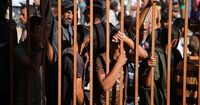On Thursday, July 10, 2025, optimism swelled around the possibility of a ceasefire agreement in Gaza, as U.S. Secretary of State Marco Rubio expressed confidence that a breakthrough could be near. Speaking at the ASEAN summit in Malaysia, Rubio told reporters, "I think we are closer, perhaps closer than we have been in a long time," reflecting a hopeful tone amid ongoing, intense negotiations.
The negotiations, described as "difficult and complex," are taking place in Doha, where delegations from Hamas and Israel have engaged in seven rounds of talks since Sunday evening, July 6. These sessions have yielded "slight to noticeable" progress on several critical issues, including detainees, humanitarian aid, and the withdrawal of Israeli military forces from the devastated Gaza Strip.
U.S. envoy Steve Witkoff, who is expected to arrive in Doha soon to further energize the talks, shares this optimism about the potential for indirect discussions to pave the way for a ceasefire. His involvement underscores the significant role the United States is playing in facilitating dialogue between the two sides.
One of the key milestones in the negotiations has been the agreement on a detainee exchange. According to a knowledgeable source who spoke to Asharq, the parties have agreed to release 10 live Israeli detainees in two batches, along with several bodies, in exchange for Palestinian prisoners. The final details, including the total number of prisoners and the inclusion of those serving life sentences or long terms, remain under discussion.
Progress has also been made on mechanisms for delivering humanitarian aid. After U.S. intervention, a preliminary understanding was reached to allow sufficient aid to enter Gaza through international organizations such as the United Nations and UNRWA, rather than solely through the Israeli- and U.S.-backed Gaza Humanitarian Foundation. This development follows a meeting between Qatari and U.S. officials in Washington, highlighting the international coordination behind the scenes.
Despite these advances, a Palestinian official involved in the talks told Asharq that the negotiations remain "arduous, difficult, complex, and require significant U.S. and international pressure for a real agreement to end the war." This candid assessment underscores the fragile nature of the progress and the challenges ahead.
On the Israeli side, a senior official conveyed to Reuters that a ceasefire agreement with Hamas could be reached within one or two weeks. The official noted that Israel would propose a temporary ceasefire but warned, "If Hamas does not lay down its arms, Israel will continue military operations." This statement reflects Israel's readiness to maintain military pressure if the ceasefire terms are not fully respected.
Meanwhile, Hamas announced on Wednesday, July 9, that it had agreed to release 10 detainees as part of ongoing efforts to secure a ceasefire in Gaza. However, the group emphasized that critical issues remain unresolved. In a press statement, Hamas highlighted "fundamental points" still under negotiation, including the flow of humanitarian aid, the withdrawal of Israeli forces from Gaza, and the provision of real guarantees for a permanent ceasefire.
The statement also affirmed that Hamas leadership is continuing "intensive and responsible efforts" to ensure the success of the current negotiation round. Their goal is a comprehensive agreement that ends the aggression, secures the free and safe entry of humanitarian aid, and alleviates the worsening suffering in Gaza.
Adding further context, Axios reported that on Tuesday, July 8, high-level U.S., Israeli, and Qatari officials held secret talks at the White House to address the main remaining obstacle to a long-awaited Gaza deal. According to two informed sources, three out of four points of contention had been resolved in recent days, but the sticking point concerned the lines to which Israeli forces would withdraw during a proposed 60-day truce.
Although the secret meeting was tense, it resulted in "tangible progress" on this critical issue, signaling that while challenges remain, momentum toward a ceasefire is building.
The ongoing negotiations represent a complex balancing act amid a devastated Gaza Strip, where the humanitarian situation continues to deteriorate. The involvement of multiple international actors—the United States, Qatar, the United Nations, and others—illustrates the global stakes in ending the conflict.
As the talks continue in Doha, the eyes of the world remain fixed on whether these tentative steps can culminate in a lasting ceasefire. The coming weeks will be crucial in determining if the parties can overcome their differences and provide much-needed relief to civilians caught in the crossfire.

